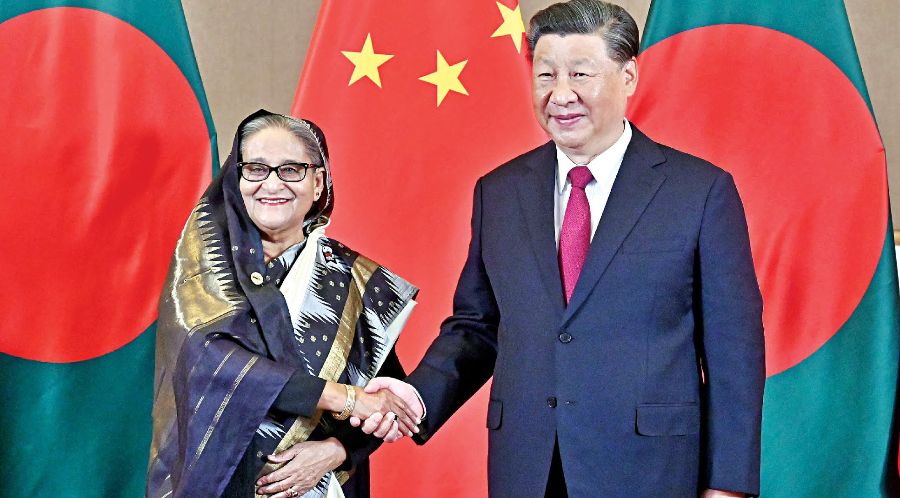The Prime Minister of Bangladesh is scheduled to visit China from 8 to 11 July 2024. Comprehensive Economic Partnership Agreement (CEPA) talks and 17 MoUs are expected to feature the visit. In recent years, Bangladesh’s relationship with China has grown significantly, fostering mutual benefits and strategic cooperation. This evolving partnership, rooted in historical ties and shared aspirations for economic development, holds immense potential for both nations. However, it also comes with complexities that require careful navigation to ensure a balanced and sustainable future.
Historical Context and Diplomatic Ties
The diplomatic relationship between Bangladesh and China dates back to 1975, shortly after Bangladesh’s independence. Over the decades, this bond has strengthened through mutual respect, non-interference in internal affairs, and a shared vision for regional stability and prosperity. China’s recognition of Bangladesh’s sovereignty and subsequent support in international forums have laid a strong foundation for their bilateral relationship.
The two countries’ historical connection extends beyond formal diplomatic ties. Cultural and economic exchanges date back to ancient times, when the Silk Road facilitated interactions between South Asia and China. This deep-rooted history provides a cultural affinity that enhances modern diplomatic relations, especially after Chinese President Xi Jinping’s visit to Bangladesh in October 2016. The visit yielded the signing of 27 deals between the government and 13 joint venture agreements between Bangladeshi and Chinese companies involving around $40 billion commitment.
Economic Cooperation and Infrastructure Development
Economic collaboration forms the cornerstone of Bangladesh-China relations. China is Bangladesh’s single largest trading partner, with bilateral trade surpassing $24 billion in recent years. This trade dynamic is heavily tilted in favor of China, with Bangladesh striving to balance the trade deficit through increased exports. In the 2022-23 fiscal year, Bangladesh’s exports to China were valued at approximately $677 million, whereas the imports accounted for $22.90 billion, highlighting the significant trade imbalance. To address this, Bangladesh focuses on diversifying its export portfolio, promoting sectors such as ready-made garments, pharmaceuticals, leather, and jute products.
One of the most visible aspects of this partnership is China’s involvement in Bangladesh’s infrastructure development. China’s Belt and Road Initiative (BRI) has seen significant investments in Bangladesh, including the construction of the Padma Bridge, Payra Power Plant, and various road and rail networks. These projects are not only transforming Bangladesh’s infrastructure landscape but also creating employment opportunities and stimulating economic growth.
The Padma Bridge, a multi-purpose road-rail bridge across the Padma River, is a landmark project symbolizing the depth of Bangladesh-China cooperation. With an estimated cost of $3.86 billion, partly financed by Chinese loans and technical assistance, the bridge is expected to boost Bangladesh’s GDP by 1.2 percent by improving connectivity and reducing travel time across the country. Similarly, the Payra Power Plant, a coal-fired power station, is a key project under the BRI, aimed at meeting Bangladesh’s growing energy demands and reducing its dependence on costly fuel imports.
Strategic and Geopolitical Dimensions
The strategic dimension of Bangladesh-China relations cannot be overlooked. Bangladesh’s geographical location makes it a crucial player in South Asia and a gateway to the Indian Ocean. For China, deepening ties with Bangladesh is part of a broader strategy to strengthen its regional presence and secure vital maritime routes.
China’s strategic interests in Bangladesh are evident in the development of the Chittagong Port, one of the busiest ports in South Asia. The port’s modernization, with Chinese assistance, aims to enhance its capacity and efficiency, positioning it as a major hub for regional trade. This development aligns with China’s Maritime Silk Road initiative, which seeks to connect Chinese ports with those in Asia, Africa, and Europe.
However, this growing closeness between Dhaka and Beijing raises concerns among other regional players, particularly India. Bangladesh has historically maintained a delicate balance in its foreign relations, avoiding over-reliance on any single nation. As it deepens ties with China, Bangladesh must continue to ensure its balanced and independent foreign policy, fostering positive relations with all major powers, including India and the United States.
India, which shares deep historical, cultural, and economic ties with Bangladesh, cautiously views China’s increasing influence in its neighborhood. Despite this, Bangladesh has adeptly managed its relations with both giants, ensuring its development agenda benefits from cooperation with China and India. Evidently, the recent visit of PM Hasina to India and China within a couple of weeks is a testament to Bangladesh’s balanced foreign policy objectives. This balancing act is crucial for maintaining regional stability and leveraging economic opportunities.
Challenges and Considerations
While the benefits of Bangladesh-China relations are evident, there are challenges that need to be addressed. The significant trade imbalance is a pressing issue that requires targeted efforts to boost Bangladeshi exports to China. Moreover, concerns about debt sustainability have emerged with the influx of Chinese loans for infrastructure projects. Bangladesh must ensure that these investments are managed prudently to avoid the pitfalls of debt dependency.
According to the Information & Broadcasting Minister of Bangladesh Mohammad A Arafat, Bangladesh’s total external debt stood at approximately $149.5 billion. While these loans have financed critical infrastructure projects, they also pose risks if not managed effectively. The experience of other countries, such as Sri Lanka, which faced debt distress due to excessive reliance on Chinese loans, serves as a cautionary tale for Bangladesh. However, Bangladesh has so far managed to maintain the win-win scenario in taking Chinese loans.
A Vision for the Future
Looking ahead, the future of Bangladesh-China relations appears promising. Both nations stand to gain from deepening cooperation in various sectors, including technology, education, and healthcare. Joint ventures in renewable energy and climate resilience can further enhance this partnership, addressing global challenges while promoting sustainable development.
The potential for collaboration in the technology sector is particularly noteworthy. China’s expertise in digital infrastructure and technology can support Bangladesh’s ambitions to become a digital economy. Investments in areas such as 5G networks, e-commerce, and digital payment systems can drive innovation and economic growth. Additionally, educational exchanges and scholarships can foster knowledge transfer and skill development, empowering Bangladesh’s youth to contribute to the country’s development.
Healthcare is another area where Bangladesh can benefit from closer ties with China. The COVID-19 pandemic underscored the importance of international cooperation in healthcare. China’s provision of medical supplies and vaccines to Bangladesh during the pandemic was a testament to the solidarity between the two nations. Building on this cooperation, joint efforts in healthcare infrastructure, research, and pharmaceutical production can enhance Bangladesh’s healthcare system and ensure better health outcomes for its population.
To conclude, the relationship between Bangladesh and China is multifaceted, encompassing economic, strategic, and cultural dimensions. While there are challenges to be managed, the potential benefits of this partnership are significant. Through continued dialogue, mutual respect, and strategic cooperation, Bangladesh and China can chart a path toward a prosperous future, contributing to regional stability and global development.
[Representational image. Credit: Prime Minister’s Office, Bangladesh]
The views and opinions expressed in this article are those of the author.


The author is an MBA student at Zhejiang Normal University, Zhejiang Province, China. He did his bachelor’s from Beijing Foreign Studies University. He is also a freelance research analyst on international strategic affairs and cross border economic studies.

